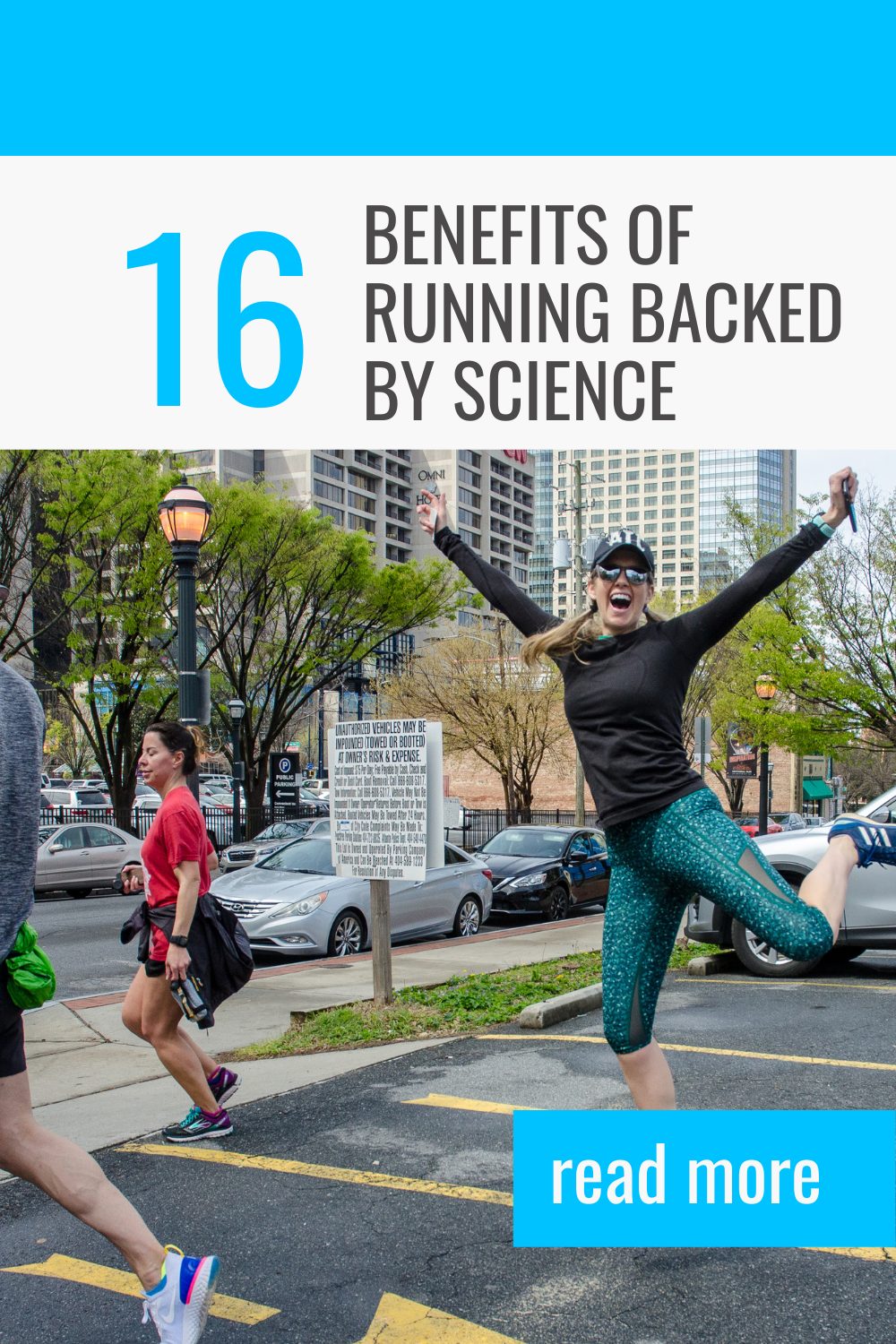16 Running Benefits That Will Get You Moving Now
Photos by Marques Jackson Photography.
By Marnie Kunz, NASM-certified trainer, USATF-, RRCA-certified running coach
Whether you’re a new runner or a seasoned marathoner, these 16 running benefits will inspire you to get out the door running right away. It’s no secret that running makes us feel better — mentally and physically. And now there are science-based facts to prove how and why running is so great. These running benefits — from living longer to being happier — are guaranteed to motivate you to get out the door for your next run.
Running Benefits Backed by Science
1. Running boosts your immune system. According to a study published in the Journal of Sport and Health Science, moderate, regular running strengthens your immune system. Running helps reduce inflammation in the body, improves the body’s surveillance against disease, reduces your risk of upper respiratory infections and influenza, and improves antibody response. All of which is key during coronavirus pandemic times.
2. Running prevents heart disease. Compared with non-runners, regular runners have half the chance of dying from heart disease. Every time you run, your heart gets stronger and your resting heart rate decreases, so your heart doesn't need to work as hard, says exercise physiologist Greg Justice, founder of AYC Health & Fitness in Kansas City.
3. Running makes you live longer. According to research from the Aerobics Center Longitudinal Study, runners had a 30 percent lower risk of death from all causes and a 45 percent lower risk of death from heart disease or stroke compared to non-runners.
4. Running helps prevent osteoporosis. Since running is a weight-bearing exercise, it helps build and maintain bone density, warding off chronic conditions such as osteoporosis.
5. Running is accessible to everyone. Running is a natural movement that can be done anytime and anywhere with just a pair of running shoes. You do not need any special training or memberships to run, just yourself and the right running shoes.
6. Running makes you happier. We all know we feel better after a run but there is science to prove It - running releases endorphins in your brain, which is a “feel good” hormone. According to the Anxiety and Depression Association of America, running helps decrease overall levels of tension, elevates and stabilizes mood, improves sleep, and improves self-esteem. Even just five minutes of aerobic exercise like running can begin to stimulate anti-anxiety effects.
7. Running helps you lose weight and maintain a healthy weight. If you are interested in losing weight or maintaining a healthy weight, running is an effective way to burn calories. In fact, running and swimming burn the most calories of any aerobic exercise. As your body adjusts to running, you may hit a fitness plateau, but no need to worry — you can add intensity to your runs to burn more calories.
8. Running is cheap. There are no costs or entry fees for running beside the price of your running shoes and clothes. You do not need an expensive gym membership, fancy bike, or special equipment. You can run in your neighborhood, at a park or track, in a hotel fitness center, or on the road when you’re traveling.
9. Running helps you sleep better. Regular exercise such as running can improve the quality of your sleep and help you sleep through the night, according to a study published in the Journal of Clinical Sleep Medicine.
10. Running boosts brain power and prevents Alzheimer's disease. According to the Mayo Clinic, running improves your cognitive functioning by increasing gray matter and reducing your risk of common brain issues associated with aging, including dementia and Alzheimer's disease.
11. Running lowers cholesterol. Running is one of the best exercises to help lower cholesterol. Lower cholesterol is tied to a healthier heart, preventing heart disease.
12. Running reduces your risk of cancer. According to the American Cancer Society, running regularly helps reduce your risk of cancer and the American Cancer Society recommends jogging as a great way to prevent cancer and other chronic diseases.
13. Running reduces your risk of diabetes. In addition to combatting cancer, running helps reduce your risk of diabetes. According to the Centers for Disease Control and Prevention, 89 percent of the 79 million Americans with pre-diabetes are not even aware they have the condition, making diabetes prevention so essential. Running regularly — 2.5 hours per week — is enough to significantly improve glucose tolerance and ward off diabetes.
14. Running reduces depression. Running not only makes you feel good but can actively help your brain battle depression. “Exercise helps appears to stimulate the growth of neurons in certain brain regions damaged by depression,” according to U.S. News and World Report. Running is a natural antidepressant that also boosts your mood.
15. Running slows down aging. Many of us runners know that running is a great stress release but did you know running also helps fight the physical effects of stress and aging over time? According to a Ball State University study at the Human Performance Laboratory, "people who exercise regularly year after year have better overall health than their sedentary counterparts." In the study, 75-year-olds who had been exercising regularly most of their life showed cardiovascular health similar to 40- to 45-year-olds. In sedentary people, the heart muscle weakens and wears down over time, whereas in regular runners, heart and muscle tissues stay strong well into our senior years.
16. Running connects us. Running is a great way to connect with a community of healthy, positive people who are reliable, dedicated, and hard workers. When you become a runner, you’re automatically linked to a worldwide community of happy, healthy people.
How to Get Started Running and Stick With It
If you’re new to running or returning to it after a break, these tips can help you ease into a running program:
Start slow. Build your mileage and intensity gradually. Add no more than 10 percent to your miles each week. So if you run 10 miles one week, you can add 1 mile - or 10 percent - to run 11 miles the next week. This will help prevent you from getting injured or burned out.
Get social. Run with a partner or your dog for companionship. This will make your runs more fun and also keep you accountable (my dog is the bossiest running partner I’ve had, reminding me to go at the same time every day.😂)
Set a goal. Having a goal will help you get motivated to run on those days when you’re tired or the weather is bad. Pick a race to train for or set a goal to run a certain distance or time and this will fuel your training.
Reward yourself for milestones. When you meet one of your running goals, celebrate! Treat yourself to something you love doing, or practice some self-care (check out our 51 self-care ideas for inspo).
Follow a training plan. It’s very hard to get to where you want to be without following a plan. Create your own running training plan or check out our shop if you need a training plan created by a run coach (me).
Enjoy! Remember you are running for yourself, no one else, so enjoy it! Running is a privilege that helps us enjoy our bodies and health, so make the most of it.
What are the best running benefits that keep you going? Tag @Runstreet on Instagram to share your runs and get cheered on. Here’s to many happy running days ahead!😊
Related Posts: Running for Anxiety Benefits, Speed Training for Beginners, Improve Your Running with Progressive Overload, What to Eat Before Running
Marnie Kunz is a NASM-certified personal trainer, USATF, and RRCA-certified running coach, and the creator of Runstreet Art Runs, which bring together communities through running and street art. She is a Brooklyn resident, trainer, Akita mom, and writer. She enjoys running coaching, traveling, art, and eating messily. You can follow her running and events at @Runstreet Instagram.




